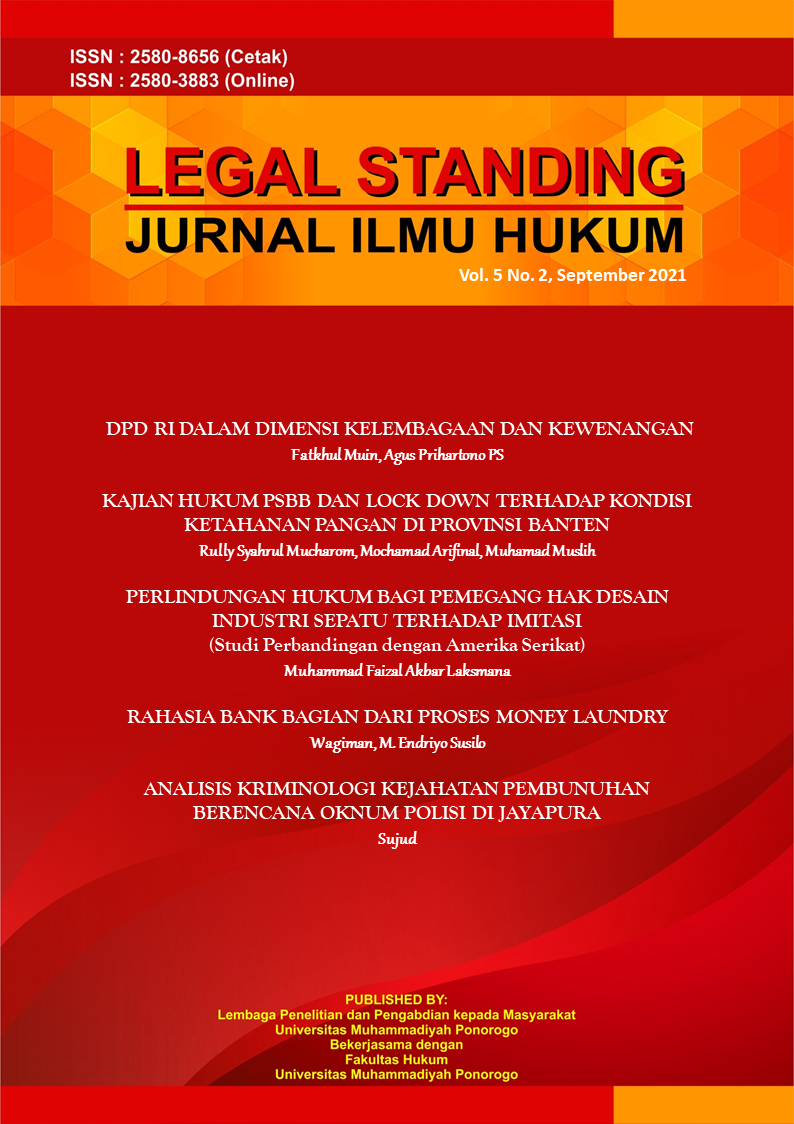TINJAUAN YURIDIS TERHADAP MEREK NEUROBION DAN BIONEURON BERDASARKAN PUTUSAN NOMOR : 409K/Pdt. Sus-HKI/2015
DOI:
https://doi.org/10.24269/ls.v5i2.3970Abstract IPR is part of the brand which stands for Intellectual Property Rights. The function of a mark is to give a marker or indicate a distinguishing power which is intended so that a service or goods in a company can be identified. Similarly, the Neorobion and Bioneuron brands involved in the brand dispute case in this study. The purpose of this study is to analyze legal arrangements, legal protection and judges' considerations in deciding disputes against Judges' Decisions related to the case of the Neurobion and Bioneuron brand disputes. This research applies normative juridical research method which is descriptive analytical. The results of this study are based on a document study of the decision of the Supreme Court (MA) and an analysis of the laws and regulations. Based on the Trademark Law Regulations, it is explained that in carrying out trademark registration, substantive and formal requirements must be met. Furthermore, in this study, it is explained that legal protection for trademark ownership rights is constitutive, namely the first registrant system, and based on the analysis of the Decision it is explained that the Supreme Court's decision has been deemed correct and does not contradict the law, namely canceling the ownership rights of the Bioneuron Mark which registered its trademark on the basis of bad faith. because the brand has similarities and similarities in principle and in its entirety with the neurobion brand that has been previously registered so that it can mislead consumers and cause harm to the Neurobion brand.
References
[1] Adam, Rahmat, and Saiful Anwar. 2021. “Kedudukan Tertanggung Dalam Asuransi Jiwa Kredit.†Legal Standing: Jurnal Ilmu Hukum 2(1): 84–94. https://news.detik.com/berita/d-3567290/polling-58-masyarakat-puas-kinerja-kpk,.
[2] Direktorat Jenderal Kekayaan Intelektual Kementerian Hukum Dan HAM RI. 2019. Modul Kekayaan Intelektual Bidang Merek Dan Indikasi Geografis, Direktorat Jenderal Kekayaan Intelektual Kementerian Hukum Dan HAM RI.
[3] Hidayat, Ade. 2020. “KONSEP HAKI DALAM HUKUM ISLAM DAN IMPLEMENTASINYA BAGI PERLINDUNGAN HAK MEREK DI INDONESIA.†ADLIYA: Jurnal Hukum dan Kemanusiaan.
[4] Jened, Rahmi. 2015. Hukum Merek Trademark Law Dalam Era Global Dan Integrasi Ekonomi. Jakarta: Kencana.
[5] Lobo, Lionita Putri, and Indirani Wauran. 2021. “KEDUDUKAN ISTIMEWA MEREK TERKENAL (ASING) DALAM HUKUM MEREK INDONESIA.†Masalah-Masalah Hukum.
[6] Marzuki, Peter Mahmud. 2008. Penelitian Hukum. Jakarta: Kencana.
[7] Miru, Ahmadi. 2005. Hukum Merek : Cara Mudah Mempelajari Undang-Undang Merek. Jakarta: PT. Raja Grafindo Persada.
[8] Nurachmad, Much. 2012. Segala Tentang HAKI Indonesia Buku Pintar Memahami Aturan HAKI Kita. Jogjakarta: Buku Biru.
[9] Peraturan Pemerintah RI. 2001. Undang-Undang Nomor 15 Tahun 2001 Tentang Merek.
[10] Roisah, Kholis. 2015. “Kebijakan Hukum Terhadap Perlindungan HAKI.†Jurnal Law Reform.
[11] Siregar, Enni Sopia, and Lilys Sinurat. 2019. “PERLINDUNGAN HAKI DAN DAMPAKNYA TERHADAP PEREKONOMIAN INDONESIA DI ERA PASAR BEBAS: PENDEKATAN KEPUSTAKAAN.†NIAGAWAN.
[12] Sulastri, Satino, and Yuliana Yuli W. 2015. “Perlindungan Hukum Terhadap Merek (Tinjauan Terhadap Merek Dagsxang Tupperware Versus Tulipware.†Jurnal Yuridis 5(1): 166–68.
[2] Direktorat Jenderal Kekayaan Intelektual Kementerian Hukum Dan HAM RI. 2019. Modul Kekayaan Intelektual Bidang Merek Dan Indikasi Geografis, Direktorat Jenderal Kekayaan Intelektual Kementerian Hukum Dan HAM RI.
[3] Hidayat, Ade. 2020. “KONSEP HAKI DALAM HUKUM ISLAM DAN IMPLEMENTASINYA BAGI PERLINDUNGAN HAK MEREK DI INDONESIA.†ADLIYA: Jurnal Hukum dan Kemanusiaan.
[4] Jened, Rahmi. 2015. Hukum Merek Trademark Law Dalam Era Global Dan Integrasi Ekonomi. Jakarta: Kencana.
[5] Lobo, Lionita Putri, and Indirani Wauran. 2021. “KEDUDUKAN ISTIMEWA MEREK TERKENAL (ASING) DALAM HUKUM MEREK INDONESIA.†Masalah-Masalah Hukum.
[6] Marzuki, Peter Mahmud. 2008. Penelitian Hukum. Jakarta: Kencana.
[7] Miru, Ahmadi. 2005. Hukum Merek : Cara Mudah Mempelajari Undang-Undang Merek. Jakarta: PT. Raja Grafindo Persada.
[8] Nurachmad, Much. 2012. Segala Tentang HAKI Indonesia Buku Pintar Memahami Aturan HAKI Kita. Jogjakarta: Buku Biru.
[9] Peraturan Pemerintah RI. 2001. Undang-Undang Nomor 15 Tahun 2001 Tentang Merek.
[10] Roisah, Kholis. 2015. “Kebijakan Hukum Terhadap Perlindungan HAKI.†Jurnal Law Reform.
[11] Siregar, Enni Sopia, and Lilys Sinurat. 2019. “PERLINDUNGAN HAKI DAN DAMPAKNYA TERHADAP PEREKONOMIAN INDONESIA DI ERA PASAR BEBAS: PENDEKATAN KEPUSTAKAAN.†NIAGAWAN.
[12] Sulastri, Satino, and Yuliana Yuli W. 2015. “Perlindungan Hukum Terhadap Merek (Tinjauan Terhadap Merek Dagsxang Tupperware Versus Tulipware.†Jurnal Yuridis 5(1): 166–68.
Downloads
Additional Files
Published
2021-09-12
How to Cite
Sembiring, D. M., T.M., S. T., & Apriyani, W. (2021). TINJAUAN YURIDIS TERHADAP MEREK NEUROBION DAN BIONEURON BERDASARKAN PUTUSAN NOMOR : 409K/Pdt. Sus-HKI/2015. Legal Standing : Jurnal Ilmu Hukum, 5(2), 91–88. https://doi.org/10.24269/ls.v5i2.3970
Issue
Section
Articles
License

Legal Standing : (Jurnal Ilmu Hukum) is licensed under a Lisensi Creative Commons Atribusi-BerbagiSerupa 4.0 Internasional.

